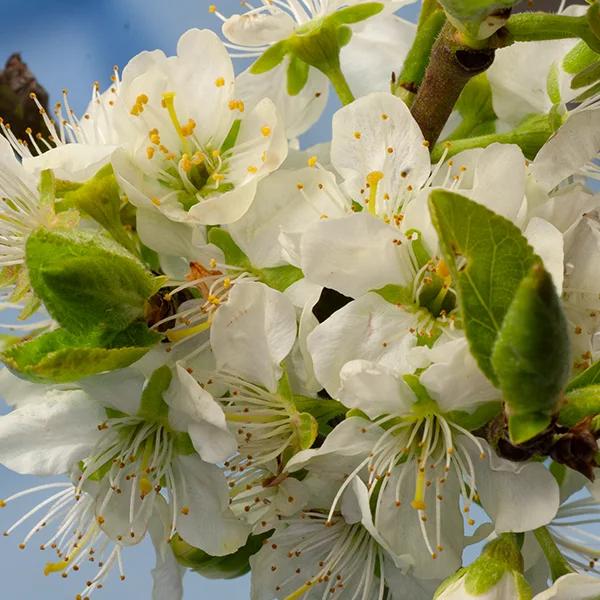Table of Contents
Many Plums Are Reliably Self Fertile
Most plums are either reliably self fertile or partially self fertile, so pollination is much less of an issue than with most other fruit trees; even “Non-Self Fertile” varieties are more like “Low-Self Fertile”.
And there are probably compatible plums already in your neighbourhood.
Plum Pollination
Use our easy pollination checking tables or pollination tool to quickly find partners for a given tree, or browse the table below.
Plums, Gages, Damsons, Mirabelles and Bullaces are closely related trees of the species Prunus domestica and its subspecies insititia, so they pollinate each other when they are in flower at the same time.
Pollination groups represent flowering periods, and trees will cross-pollinate with other trees in their own group and adjacent groups, e.g. a tree in Pollination Group C will cross-pollinate with trees in groups B, C, and D (note that the letters can be replaced with numbers, so Group C is the same as Group 3)
For example, a tree in group C will cross-pollinate with trees in groups B, C and D.
Plum Pollination Groups Chart
| Name | Use | Harvest | Pollination Group | Fertility | Colour |
|---|---|---|---|---|---|
| Aprimira (Miracot) | Dessert | August | A / B | Self Fertile | Yellow-Pink |
| Jeffersons Gage | Dessert | Late Aug | B | Non Self Fertile | Green |
| Mirabelle Golden Sphere | Dual | Mid Aug | B | Partially Self Fertile | Yellow |
| Mirabelle Ruby | Dessert | Late Aug | B | Partially Self Fertile | Red-Purple |
| Victoria | Dessert | Late Aug | B | Very Self Fertile | Rosy-red, some yellow |
| Belle de Louvain | Culinary | Aug | C | Self Fertile | Purple |
| Coe’s Golden Drop | Dessert | Late Sept | C | Non Self Fertile | Yellow |
| Dennistons Superb | Dessert | Late Aug | C | Self Fertile | Yellow |
| Rivers Early Prolific | Culinary | Late July | C | Partially Self Fertile | Blue |
| Langley Bullace | Culinary | Late Sept | C | Self Fertile | Blue-Black |
| Merryweather Damson | Culinary | Early Sept | C | Self Fertile | Blue-Black |
| Opal | Dessert | Early Aug | C | Self Fertile | Purple |
| King Damson | Culinary | September | D | Self Fertile | Blue-Black |
| Old Greengage | Dessert | August | D | Non Self Fertile | Yellow |
Self-fertile plum varieties
‘Victoria’ plums are the default must-have go-to for a single or first tree. Otherwise,
Remember that self-fertile fruit trees are not really self-pollinating: they still need bees and other insects to move their pollen around their flowers.
Insects (Mainly Bees) are Vital for Pollination

Bees and other insects carry pollen between flowers: even self-fertile trees need them to move their own pollen around their flowers, so an orchard is an ideal place for a beehive, and to encourage wild bees.
In exposed, windy locations, or at high altitude above about 800ft, bees find it hard to fly, so it is even more important to provide habitats and windbreaks to help them out; also, it’s best to stick to reliably self-fertile varieties that make the most of limited pollinators.
How close do plum trees need to be to cross-pollinate?
The closer they are, the better, but anything within 500 feet / 150 metres should be fine.
Can Plums Pollinate Apples or Pears or Cherries?
No, plums won’t pollinate cherries or any other fruit tree.
The Cherry Plum tree, Prunus cerasifera, is not a plum-cherry hybrid, but is probably ancestral to most cultivated plums of pure Prunus domestica lineage, and does pollinate them.
